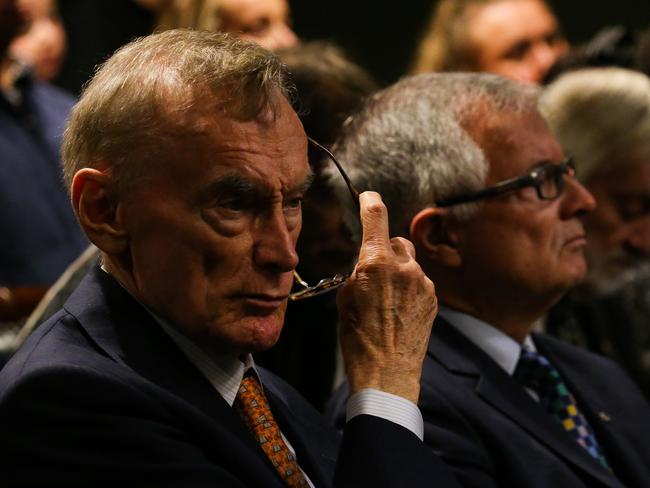Joe Hildebrand: Boris Johnson was a colourful politician, should he be ousted for it?
Every politician has their ups and downs, but should their political careers be in hot water for the colourful and downright quirky, writes Joe Hildebrand.
Opinion
Don't miss out on the headlines from Opinion. Followed categories will be added to My News.
The fall of Boris Johnson teaches us all a number of hard political lessons.
For example if you’re going to force a nation into the isolationist misery of lockdown then you probably shouldn’t celebrate it by having parties every Friday night and if you’re trying to restore faith and integrity in your government you probably shouldn’t promote people with the nickname “Pincher by name, Pincher by nature”.
But it also raises a sadder question: Is this the death of the colourful politician?
Because for all Boris’s faults, he was fun — and funny. And that is something sorely missing in public life.
In Australia the last two larrikin leaders were probably Paul Keating and Bob Carr — although the latter would have no doubt corrected the record to reflect that “larrikin” was a corruption of the Ancient Greek “larekos” which subsequently got bastardised by the merging of Medieval Latin with Germanic Saxon English as anyone would understand had they read the complete works of Goethe.

But he was funny.
So was Donald Trump, a fact that his detractors always missed in struggling to understand his mass appeal and notoriously long and well-attended rallies. Trump was crazy, delusional and — at the end — downright dangerous. But he was also bloody entertaining.
Sadly we are now seeing what the world looks like with a US president with just as much brain fade but none of the zingers. Everybody still dies but we don’t get to go out laughing.

Boris was always different. Lefties tried to paint him as a British Trump but is another failure of understanding.
Trump was an asteroid that crashed into the Republican party from a distant atmosphere and collided with a grassroots movement already growing underneath.
Trump and the Tea Party had little relationship with each other until they both became president together. Indeed, as far as the Republican establishment was concerned Trump may as well have been an alien species.
Boris, on the other hand, was a Catherine wheel already circling within the peripheries of the Conservative Party, like a stunt motorcyclist riding the innards of a spherical cage.

Unlike Trump, he was an establishment radical, someone who often went off the rails but at least spent some time on them.
And so in the infamous parlance of former US Defense Secretary Donald Rumsfeld, Trump was an unknown but Boris was a known unknown. Perhaps this is why Trump’s reign ended with a comical insurrection and Johnson’s has ended with a belated resignation.
It is also why, while Trump’s self-combustion was probably inevitable and necessary, Johnson’s is a genuine shame. Whatever his faults, Johnson was interesting — which is more than you can say about 90 per cent of politicians these days.
But as a Melbourne songwriter once sang of Jeff Kennett in the 1990s: “It’s just not enough to be a fun guy now.” And it seems there is no longer any place for fun in politics.
And that is especially so when you have a crisis as chronic as Covid-19 descending on the world like a pall.
At least wars enable great speeches — like those of Johnson’s hero Winston Churchill. Pandemics, by contrast, require rules and regulations, tedium and discipline, all of which are anathema to someone like Boris.
John Howard — a conservative titan few would accuse of being colourful — famously said of his impending prime ministership “the times will suit me” and the times simply did not suit Boris Johnson.
Had his biggest problem been Brexit or even the war in Ukraine he would probably still be riding high but the crushing monotony of the pandemic and the humourlessness it has unearthed in national populations has rendered impossible any form of leadership that isn’t equally dour.
And that is a shame. Politics was once the natural home of the interesting and eccentric but in a culture of online outrage either quality is grounds for instant disqualification and any remark that deviates from the insufferably banal can lead to instant dismissal.
Few could imagine Paul Keating’s legendary and often hilarious sledges being tolerated now — and if similar utterances were made by a conservative PM they would be burned at the stake.
This of course is the irony free part of the outrage cycle — that remarks deemed inappropriate must be met with a wave of violent condemnation that is infinitely more brutal than whatever comments preceded it.

Shortly after dipping his toe into Twitter years ago Bob Carr — one of the wittiest and politicians of the modern age — privately marvelled to me that anyone could withstand the torrents of abuse and outrage he found there.
And even insufferably banal comments are no protection, as SA Premier Peter Malinauskas found out during his election campaign. Malinauskas was on a public jog when he was ambushed by a group of Liberal protesters who ran beside him in T-shirts with critical messages.
No crime there – but when the protesters slowed down Malinauskas ribbed them by saying “Given up girls?” Needless to say that demanded a public apology.
And so we complain about our politicians being bland and beige and scripted but crucify them when they are anything but.
No wonder Boris was so popular before he was public enemy number one.





